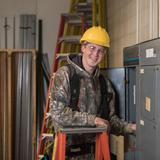- The North Dakota State College of Science is a comprehensive,associate degree granting college founded on a tradition of quality and integrity. We deliver learner-focused education through a unique and evolving collegiate experience. Using innovative delivery strategies, NDSCS anticipates and responds to statewide and regional needs by providing access to occupational/technical programs, transfer programs, and workforce training.
School Highlights
North Dakota State College of Science serves 3,803 students (42% of students are full-time).
The college's student-teacher ratio of 12:1 is lower than the state community college average of 14:1.
Minority enrollment is 35% of the student body (majority Black and Hispanic), which is more than the state average of 34%.
Quick Facts (2026)
- Enrollment: 3,803 students
- In-state tuition: $4,438
- Out-state tuition: $10,850
- Acceptance Rate: 95%
- Student-teacher ratio: 12:1
- Minority enrollment: 35%
- Source: Integrated Postsecondary Education Data System (IPEDS)
Top Rankings
North Dakota State College of Science ranks among the top 20% of public schools in North Dakota for:
Category
Attribute
Community Size
School Overview
The teacher population of 321 teachers has stayed relatively flat over five years.
North Dakota State College of Science
(ND) Community College Avg.
Carnegie Classification
Associate's Colleges: High Career & Technical-High Traditional
Baccalaureate/Associate's Colleges: Mixed Baccalaureate/Associate's
Institution Level
At least 2 but less than 4 years
At least 2 but less than 4 years
Institution Control
Public
Public
Total Faculty
321 staff
99 staff
Student Body
The student population of North Dakota State College of Science has grown by 34% over five years.
The student-teacher ratio of 12:1 has decreased from 17:1 over five years.
The North Dakota State College of Science diversity score of 0.52 is less than the state average of 0.54. The school's diversity has grown by 63% over five years.
Total Enrollment
3,803 students
1,081 students
Student-Teacher Ratio
12:1
14:1
# Full-Time Students
1,586 students
330 students
# Part-Time Students
2,217 students
751 students
# Enrollment Undergraduate
380 students
248 students
# Full-Time Undergraduate Students
1,586 students
330 students
# Full-Time Graduate Students
n/a
12 students
# Part-Time Undergraduate Students
2,217 students
751 students
# Part-Time Graduate Students
n/a
10 students
Total Dormitory Capacity
1,125 students
259 students
% American Indian/Alaskan
n/a
1%
% Asian
1%
1%
% Hispanic
3%
4%
% Black
4%
4%
% White
65%
66%
% Hawaiian
n/a
4%
% Two or more races
3%
4%
% Non Resident races
n/a
2%
% Unknown races
23%
14%
Diversity Score
0.52
0.54
College Completion Rate (Students who graduate in less than 4 years)
44%
45%
College Completion Rate (Students who graduate in 4 years or more than 4 years)
n/a
55%
Average Graduate Earnings (10 Years)
$45,800
$38,300
Tuition and Acceptance Rate
The public in-state tuition of $4,438 is more than the state average of $4,431. The in-state tuition has declined by 18% over four years.
The public out-state tuition of $10,850 is more than the state average of $7,084. The out-state tuition has grown by 70% over four years.
In-State Tuition Fees
$4,438
$4,431
Out-State Tuition Fees
$10,850
$7,084
% Students Receiving Some Financial Aid
91%
94%
Median Debt for Graduates
$12,000
$10,754
Median Debt for Dropouts
$5,500
$5,500
Acceptance Rate
95%
92%
SAT Reading
n/a
520
SAT Math
n/a
545
SAT Writing
n/a
470
ACT Composite
n/a
19
ACT English
n/a
18
ACT Math
n/a
20
ACT Writing
n/a
7
Source: 2024 (or latest year available) Integrated Postsecondary Education Data System (IPEDS) , School Administrators
School Notes
- School Mascot: Wildcats
- Since 1922, the North Dakota State College of Science has provided practical, hands-on education for thousands of students who, upon graduation, became available to meet business, professional, and industrial needs. In 1987 North Dakota State School of Science changed its name to North Dakota State College of Science. In the year 1992 the North Dakota State College of Science converted from the quarter system to the semester system and in 1997 Established the Skills & Technology Training Center (STTC) as a regional workforce training center located in Fargo, North Dakota. The North Dakota State College of Science is located in Wahpeton, a progressive city with a population of 8,586 in the southeastern corner of North Dakota. The North Dakota State College of Science features 38 buildings on 125 acres - residence halls, a library, a complete students center, over 20 computer labs, a modern performing arts theater, a swimming pool, weights and exercise equipment and on-campus athletic facilities. Facilities include the latest in equipment in all shops, laboratories and classrooms. A library facility that provides a collection of 90,000 volumes with group and individual study areas. The College has two state-of-the-art Interactive-Video Network (IVN) labs for distance learning from other campuses or locations. North Dakota State College of Science offers education and training designed to enable students to acquire the entry-level vocational/ technical competencies necessary to enter the workforce. The North Dakota State College of Science offers 34 degree programs. Within these degree programs, there are 52 additional emphasis areas which focus on a particular specialty. The college is accredited by The Higher Learning Commission and a member of the North Central Association.
Frequently Asked Questions
How much does North Dakota State College of Science cost?
North Dakota State College of Science's tuition is approximately $4,438 for In-State students and $10,850 for Out-State students.
What schools are North Dakota State College of Science often compared to?
North Dakota State College of Scienceis often viewed alongside schools like Bismarck State College by visitors of our site.
What is the acceptance rate of North Dakota State College of Science?
The acceptance rate of North Dakota State College of Science is 95%, which is higher than the state average of 92%.
What is North Dakota State College of Science's ranking?
North Dakota State College of Science ranks among the top 20% of community college in North Dakota for: Largest student body.
Recent Articles

Most In-Demand Community College Majors for 2025–26
Explore the most in-demand community college majors for 2025–26 workforce needs, aligned with hiring trends, wages, and transfer pathways.

New Guidebook Helps Students Navigate Community College
A new guidebook offers practical strategies to help students and families succeed in community college, from admissions to transfer and career planning.

Work-Study Opportunities for Spring 2026 Guide
Learn how to secure work-study opportunities for Spring 2026 before classes start, including timelines, tips, and eligibility guidance.










